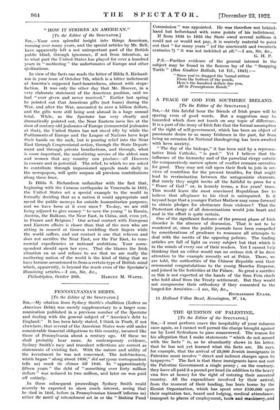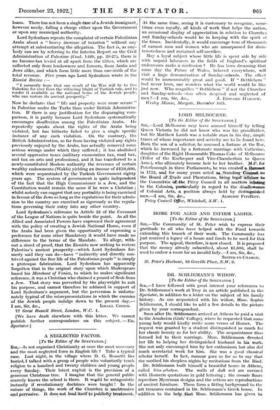THE QUESTION OF PALESTINE.
[To the Editor of the SPECTATOR.] Sin,—I must perforce crave the hospitality of your columns once again, as I cannot well permit the charge brought against me by Lord Sydenham to pass unanswered. The reason for his allegation that I make statements " which do not accord with the facts " is, as he abundantly shows in his letter, that he has not yet learned what the facts are. He says, for example, that the arrival of 23,000 Jewish immigrants in Palestine must involve " direct and indirect charges upon its taxpayers." The fact is that these immigrants have not cost the Palestine Government a single penny ; on the contrary, they have all paid it a pound per head (in addition to the heavy visa fees at home) for the right of entering their ancestral country. All the expenditure involved by their arrival, from the moment of their landing, has been borne by the Zionist Organization, which has spent over £100,000 upon their capitation tax, board and lodging, medical attendance, transport to places of employment, tool* aad machinery, and
loans. There has not been a single twee of a Jewish immigrant , however needy, falling a charge either upon the Government or upon any municipal authority.
Lord Sydenham repeats the complaint of certain Palestinian Arabs about a " heavy increase of taxation " without any attempt at substantiating the allegation. The fact is, as any- body can see by referring to the Interim Report on the Civil
Administration of Palestine (Cmd. 1499, pp. 26-27), there is no Income-tax levied at all apart from the tithes, which are collected only froth. landowners and farmers, from Arabs and Jews alike, and which form little more than one-sixth of the
total revenue. Five years ago Lord .Sydenham wrote in the Zionist Review
"I earnestly hope that one result of the War will be to free Palestine for ever from the withering blight of Turkish rule, and to render it available as the national home of the Jewish people, who can restore its ancient prosperity."
Now he declares that " life and property were more secure " in Palestine under the Turks than under British Administra- tion. If there is any justification for the disparaging com- parison, it is partly because Lord Sydenham systematically encourages disaffection among the Palestinian Arabs. He repeatedly speaks about the rights of the Arabs being violated, but has hitherto failed to give a single specific instance of any such violation. On the contrary, the British Administration, so far from having violated any rights previously enjoyed by the Arabs, has actually removed some serious wrongs under which they suffered ; it has abolished several oppressive taxes (military exoneration tax, road tax, and tax on arts and professions), and it has transferred to a newly-constituted Moslem authority the revenues of certain wealthy endowments (Wakfs) yielding an income of £E18,000, which were -sequestrated by the Turkish Government eighty
years ago. The system of government is quite independent of the fact that the High Commissioner is a Jew, and the Constitution would remain the same if lie were a Christian ; whilst nobody can suggest that any partiality is being exercised in favour of the Jews so long as the regulations for their admis- sion to the country are exercised as rigorously as the regula-
tions governing their entry into any other country.
Lord Sydenham's reference to Article 22 of the Covenant of the League of Nations is quite beside the point. As all the Allied and Associated Powers have expressed their agreement with the policy of creating a Jewish National Home, even if the Arabs had been given the opportunity of expressing a preference for some other Mandatory it would have made no difference to the terms of the Mandate. To allege, with- out a shred of proof, that the Zionists now seeking to restore Palestine's ancient prosperity—which Lord Sydenham for- merly said they can do—have " indirectly and directly con- trived against the free life of the Palestinian people" is simply a grotesque fabrication. Lord Sydenham has apparently forgotten that in the original story upon which Shakespeare based his Merchant of Venice, to which he makes significant reference, it was a Christian who claimed a pound of flesh from a Jew. That story was perverted by the playwright to suit his purpose, and cannot therefore be adduced in support of Lord Sydenham's argument, but the perversion is unfortu- nately typical of the misrepresentations in which the enemies
of the Jewish people indulge down to the present, day.—
[We have dealt elsewhere with this letter. We cannot publish further correspondence on this subject. —En. Spectator.]











































 Previous page
Previous page